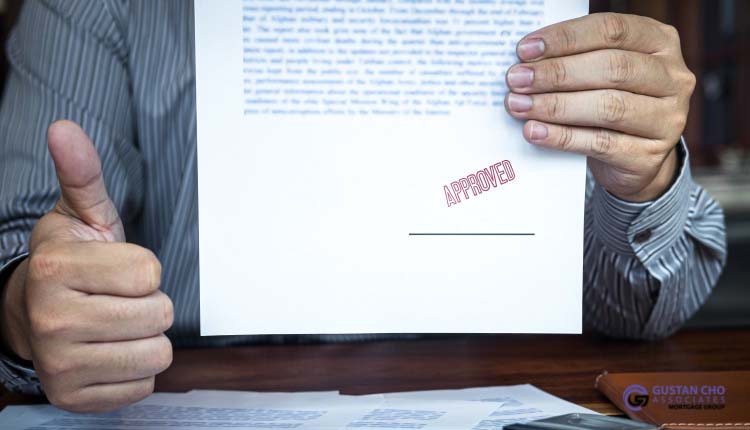This guide covers the mortgage process leading to closing for borrowers. The home buying and mortgage process leading to closing is a process. It takes time. Most closings take an average of 30 days from the time the buyer has an executed real estate purchase contract. There are times where homebuyers can close in less than 30 days. Many folks do not buy homes often.
The home buying and mortgage process does not have to be difficult or stressful. Understanding the mortgage process leading to closing for homebuyers is important.
Borrowers can do their own research or ask their loan officers . The Team at Gustan Cho Associates are experts in educating borrowers about the home buying and mortgage process. In this article, we will discuss and cover the mortgage process leading to closing for homebuyers.
Understanding The Steps of The Mortgage Process Leading To Closing
The first step in the home buying process is to get pre-approved by a lender. Not all lenders have the same lending guidelines on FHA, VA, USDA, and Conventional loans. All lenders need to have their borrowers meet the minimum agency mortgage guidelines of FHA, VA, USDA, Fannie Mae, or Freddie Mac. However, lenders can have their own lending guidelines that are above and beyond the minimum agency guidelines called lender overlays.
Gustan Cho Associates does not have any lender overlays. Over 80% of our borrowers are folks who could not qualify elsewhere. A loan officer will qualify borrowers.
Once the borrower meets all lending guidelines and the loan officer is confident the borrower is fully qualified, the loan officer will issue a pre-approval letter. A pre-approval letter is a commitment to lend by the mortgage company. With a solid pre-approval letter, the homebuyer can start shopping for a home. By this time, the homebuyer is working with a real estate agent. Once the buyer finds a home they want to buy, the real estate agent will start negotiating on the price and terms. Speak With Our Expert about steps of The Mortgage Process Closing, Click Here
Overview of Mortgage Process Leading To Clear to Close
The mortgage process leading to closing involves several steps. The first step is getting pre-approved for a mortgage. This involves getting pre-approved. Once pre-approved, you can start searching for a home within your budget. It’s important to find a property that meets your needs and fits within the loan amount you’ve been approved for.
When you find the right property, you’ll make an offer to the seller. Both the buyer and seller sign the real estate purchase contract. Once the seller accepts your offer, you move on to the next steps.
As the closing date approaches, you’ll need to finalize details with your lender, including confirming the interest rate, understanding closing costs, and ensuring all necessary documentation is in order. Your location, the type of loan, and other factors. It’s important to work closely with your real estate agent and lender throughout the process.
Mortgage Application Leading To Pre-Approval
With an accepted offer, you formally apply for the mortgage. You’ll need to provide detailed financial information, and the loan officer will your credit history and finances. The lender will typically require an appraisal. This protects the lender from lending more than the property is worth. If everything mortgage application. They will provide a commitment letter outlining the terms of the loan. Outstanding liens or issues with the property’s title. Title insurance is often required to protect against any unforeseen title problems. This can be a negotiation point for repairs or adjustments to the sale price.
Mortgage Process Leading To The Clear To Close
The major goal during the loan process is to get the mortgage underwriter to sign off on the loan. When the mortgage underwriter issues a clear to close, it means the borrower’s file has been fully processed and underwritten and the lender is ready to fund the mortgage. Once all documents are signed, the lender funds the loan, and you become the official owner of the property.
A clear to close is also referred to as the CTC. Once the lender issues the CTC, the mortgage company will prepare docs and make arrangements with the title company in setting up a closing time and date.
The closing is where the homebuyer and seller exchange title and the funds are dispersed. Once the title company clears everything and everyone from both sides have signed docs, the homebuyer will get keys to their new home purchase. Once the home purchase is closed, the home is officially the homebuyers.
Common Questions Borrowers Ask Prior To Closing
Homebuyers should not go blindly to closing not knowing what to expect. Borrowers should be prepped on what closing is and how it works. The home closing is the date where the homebuyer officially takes title and possession on a home purchase. Most closing dates are approximately 30 days from the day the lender registers and start the mortgage process.
Cosing dates can vary depending on the circumstances. For example, homebuyers purchasing a short sale can expect a longer closing date due to the delays from the lender on the seller’s side.
Short-sale homes may take 45 to 90 days or longer to close. On the flip side, many lenders can close loan in 14 to 21 days. The loan officer will explain the cash to close required for borrowers to bring to closing. The cash to close needs to be verified by the mortgage underwriter prior to the underwriter issuing a clear to close.
Pre-qualify For Your Dream Home With Gustan Cho Associates, Click Here
Preparing For The Closing
Remember that once you have closed on your home, there is no turning back. You officially own the home. A final walk-through will be scheduled a few days prior to closing. Homebuyers will have a final chance to walk through the home and make sure everything is in good working order. Before closing, you’ll receive a Closing Disclosure, which lists the closing costs.
Review the closing disclose carefully. On the closing day, you’ll sign the necessary paperwork to finalize the purchase. This includes the mortgage note, the deed, and other legal documents.
If the home has been damaged or certain things are not in the same condition as expected, this is the time to have the sellers correct it or negotiate on a discount. The quarterback at this time is the real estate agent. Your real estate agent will be with the buyers during the walk-through. If there is a problem or issue, the real estate agent will notify all parties involved and have the problem corrected. The title company will schedule the closing if everything is fine and will give the final numbers on the cash to close.
Mortgage Process Leading To Closing and The Closing Date
The closing date is scheduled by the title company. The agent at the title company will notify the buyers, sellers, realtors, and attorneys as of the time and place of the closing. The homebuyer process starts once the buyers enter into a home purchase real estate contract after they get pre-approved by the loan officer.
Once the buyers and sellers have come to terms with the price and contingencies, both will sign the real estate purchase contract. With the executed real estate contract, the mortgage process starts.
Once the buyers get the executed purchase contract, the mortgage process starts. After the borrowers get a clear to close, the lender will prepare docs for the home loan closing. On the closing date, both buyers and sellers will sign the required documents. The lender will wire the funds to the title company on the date of the closing. Once the closing is completed, the homebuyer will get their keys and have full possession of the home. Loan officers do not have to attend the closing. In most cases, you will see your real estate agent at the closing.










